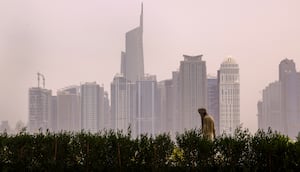As the UAE braces for one of the hottest spells of the summer, doctors are offering advice on how to stay safe as the temperature edges towards 50°C.
Hot and humid conditions at the height of summer are nothing new, but with winds picking up dust and sand, air quality can make it a difficult time to be outdoors.
Most will choose the sanctuary of working in an air-conditioned area but for those with little option but to spend time outside this summer, health professionals have called for caution.
“This week’s high temperatures, increased dust levels and humidity in Dubai can pose serious health risks, particularly to vulnerable groups such as the elderly, children, pregnant women, outdoor workers and those with respiratory or heart conditions,” Dr Mohamed Shafeeq, an internal medicine specialist at Medcare Royal Speciality Hospital, Dubai, told The National.
“To stay safe, it is advised to remain indoors during peak heat hours of 11am until 4pm, stay well hydrated and avoid strenuous outdoor activity. Those with asthma or other respiratory issues should limit dust exposure and keep their medication on hand.”

Symptoms to spot
Common signs of heat or respiratory stress include dizziness, shortness of breath, persistent coughing, fatigue and chest discomfort. Any signs of heat stroke should be followed up with medical attention.
“These symptoms should not be ignored and medical attention should be sought promptly if they arise,” said Dr Shafeeq. “Maintaining basic preventive measures during extreme weather is essential for protecting personal health and preventing avoidable complications. Public awareness and early action can make a significant difference.
“Special care should be taken with infants and the elderly, as they may not communicate symptoms clearly, and try to check on neighbours or family members who live alone. Employers should also ensure outdoor staff are given regular breaks, shade and water.”
Since June 15, employers have been told to restrict their workers’ exposure to heat, by limiting their time outdoors.
Hot weather protocols have been in place during peak summer since 2004, under an initiative by the Ministry of Human Resources and Emiratisation to keep people safe in the workplace.
The directive runs until September 15, prohibiting work in direct sunlight or open air spaces from 12.30pm until 3pm.
Ageing populations
The number of people exposed to extreme heat around the world is growing year-on-year, the World Health Organisation says.
In those over 65, a group vulnerable to heat illness, the number of older people dying from heat-related complications increased 85 per cent between 2000-2004 an 2017-2021.
Physiological factors such as age and health status have a major effect on heat vulnerability.
More people living longer into old age has put more at risk from heath complications associated with heatwaves, defined as a period where localised excess heat accumulates over a sequence of unusually hot days and nights.
Dr Deepak Gopal Dube, a specialist of internal medicine at International Modern Hospital, said heat stroke can be life threatening.
“Heat-related conditions can be anything from heat cramps to heat exhaustion and then the more severe heat stroke, which is a life-threatening condition,” he said.
“We see heat-related illnesses particularly in people who are exposed in industries in a closed environment with a lot of heat inside, and of course those working outdoors.
“These people should be very careful regarding their prolonged heat exposure, if they are older there is an even greater risk of a stroke.”
Dr Dube said regular rest stops away from direct sun can give the body an opportunity to cool down with ice packs and fluids.
“Workers exposed to the heat we are seeing currently should have intermittent rest periods, where every 30 to 45 minutes they should go to a cool place and get some hydration before resuming work,” he said.
“That can at least prevent any heat-related issues. We are getting into peak season now for temperatures, and it is likely to last until at least September so people should know the risks and take precautions.”



